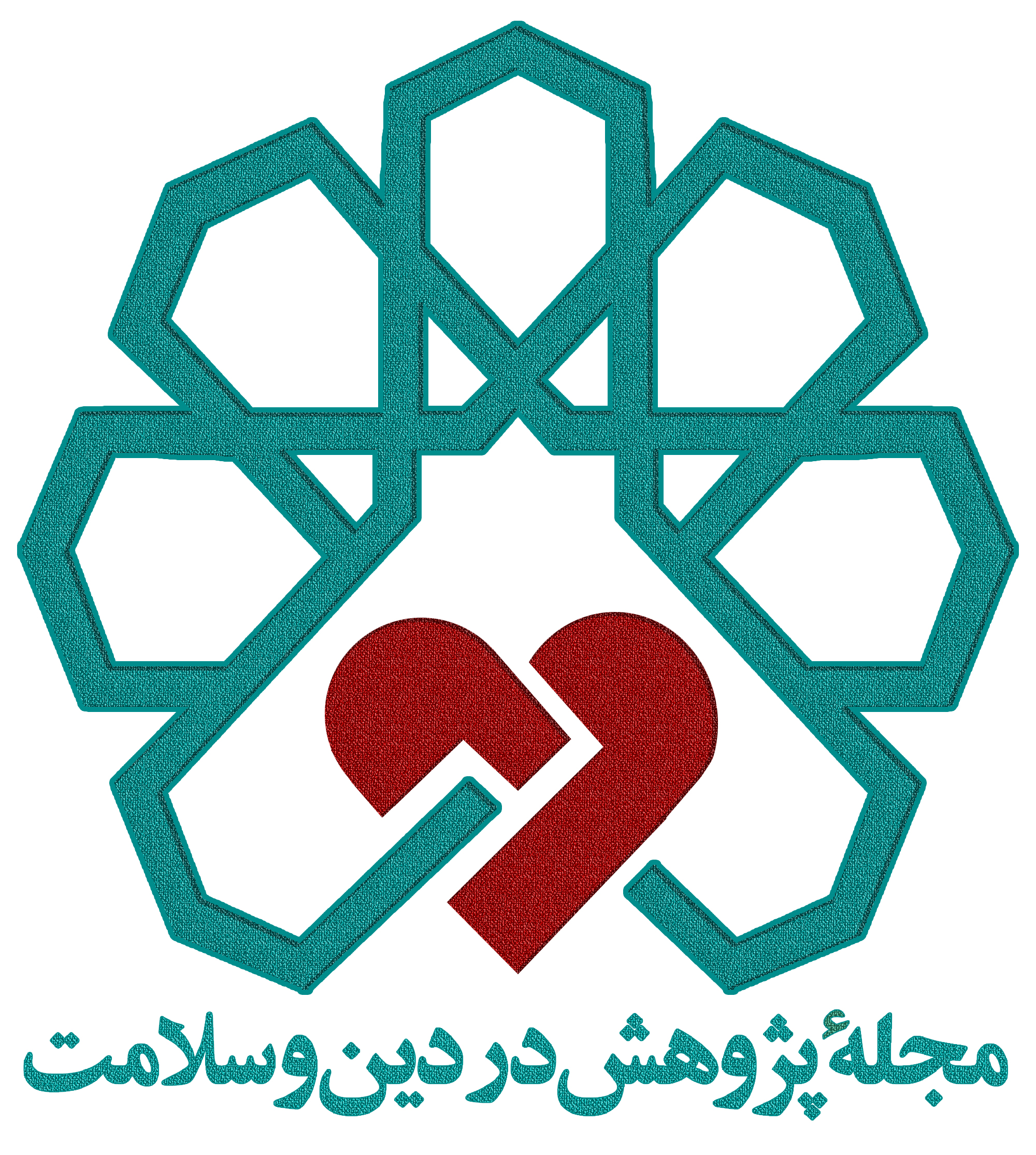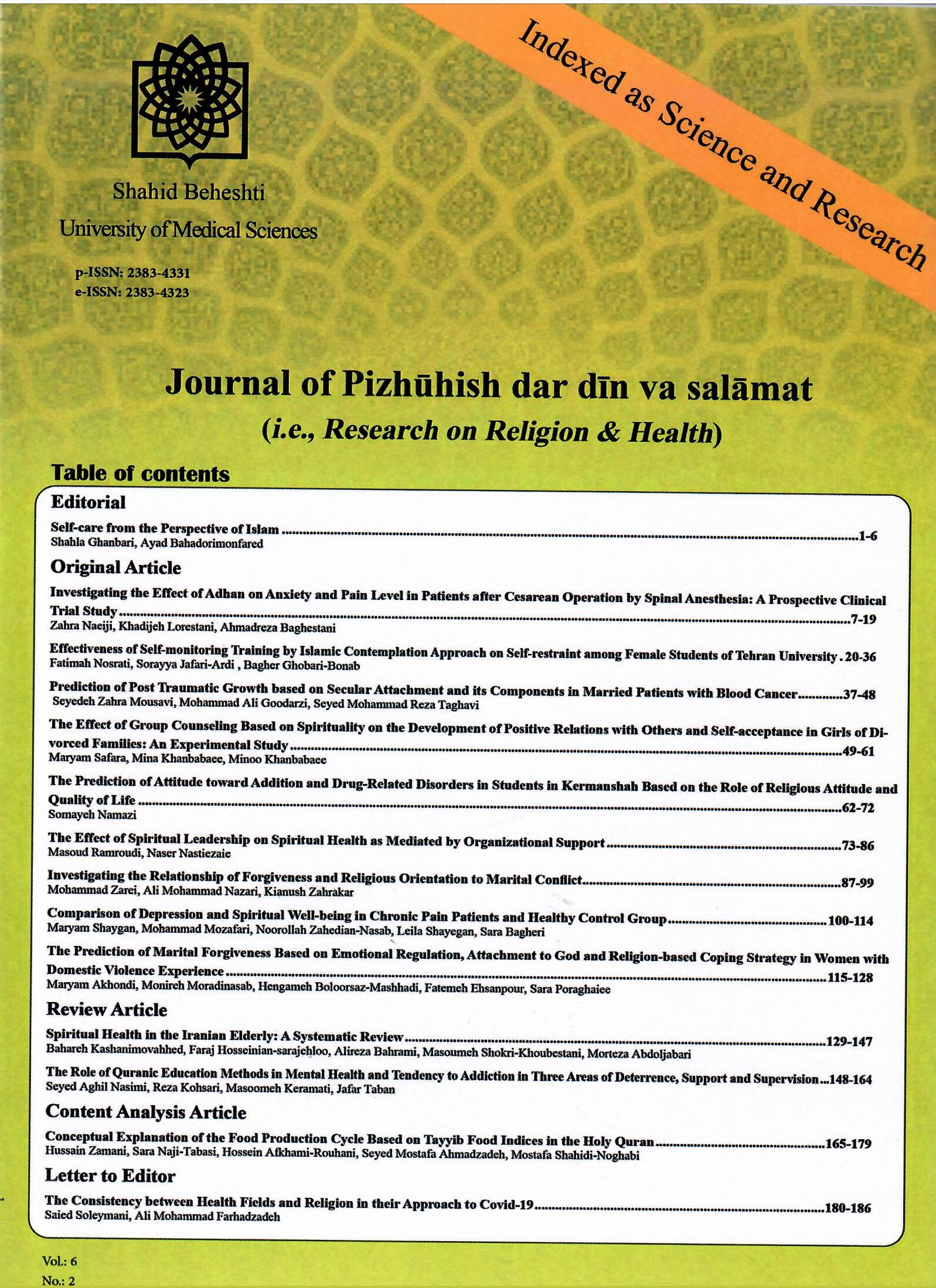بررسی رابطۀ بخشش و جهتگیری مذهبی با تعارض زناشویی
پژوهش در دین و سلامت ,
دوره 6 شماره 2 (2020),
13 June 2020
,
صفحه 87-99
https://doi.org/10.22037/jrrh.v6i2.23602
چکیده
سابقه و هدف: ازآنجاکه تعارضات زناشویی تأثیرات مخرب بیشماری بر سلامت روانی، خانوادگی و حتی جسمی افراد جامعه وارد میسازد؛ شناخت عوامل مؤثر بر آن امری ضروری به نظر میرسد. ازاینرو، پژوهش حاضر با هدف بررسی رابطۀ تعارض زناشویی با بخشش و جهتگیری مذهبی درونی و بیرونی انجام شده است.
روش کار: این پژوهش از نوع همبستگی است و جامعۀ آماری شامل معلمان متأهل و دارای فرزند شهر قم بودند که در تابستان سال 1395 آموزش ضمن خدمت میدیدند. از میان این جامعه (627N=)، بر اساس جدول مورگان نمونهای به حجم 240 نفر با روش نمونهگیری تصادفی ساده انتخاب شد. آزمودنیها با استفاده از پرسشنامههای جهتگیری مذهبی آلپورت، بخشش رای و تعارض زناشویی ثنایی و براتی ارزیابی شدند و دادهها با آزمون همبستگی پیرسون و رگرسیون چندگانه بهروش بکوارد تجزیه و تحلیل شد. در این پژوهش همۀ موارد اخلاقی رعایت شده است و مؤلفان مقاله تضاد منافعی گزارش نکردهاند.
یافتهها: نتایج نشان داد که تعارض زناشویی با بخشش و جهتگیری مذهبی درونی رابطۀ منفی و معناداری داشت ولی بین تعارض زناشویی و جهتگیری مذهبی بیرونی رابطۀ معناداری وجود نداشت.
نتیجهگیری: با توجه به یافتهها میتوان نتیجه گرفت که توجه به جهتگیری مذهبیِ زوج و تلاش برای آموزش مهارت بخشش به آنان نقش مهمی در کاهش تعارضات زناشویی خواهد داشت.
استناد مقاله به این صورت است:
Zarei M, Nazari AM, Zahrakar K. Investigating the Relationship of Forgiveness and Religious Orientation to Marital Conflict. Journal of Pizhūhish dar dīn va salāmat. 2020;6(2):87-99. https://doi.org/10.22037/jrrh.v6i2.23602
- بخشش؛ تعارض زناشویی؛ جهتگیری مذهبی
ارجاع به مقاله
مراجع
Young ME, Long LL. Counseling and therapy for couples: Thomson Brooks/Cole Publishing Co; 1998.
Greeff AP, De Bruyne T. Conflict management style and marital satisfaction. Journal of sex & marital therapy. 2000;26(4):321-34.
Barati T. The effect of marital conflicts on husband and wife interaction: University of Islamic Azad, Roudehen Branch; 1996. (Full Text in Persian)
Dunham SM. Emotional skillfulness in African American marriage: Intimate safety as a mediator of the relationship between emotional skillfulness and marital satisfaction: University of Akron; 2008.
Mahoney KR. The relationship of partner support and coping strategies to marital adjustment among women with diabetes and their male partners: New York University, College of Nursing; 2006.
Mc Cullough ME. Forgiveness: Who Does It and How Do They Do It? Current Directions in Psychological Science. 2001;10(6):194-7.
Afkhami E, Bahrami F, Fatehizadeh MS. Barresi-ye Rabeteh-ye bein Mizan-e Bakhshoodegi va Taaroz-e Zanashooei-ye Zoojein dar Ostan-e Yazad. Journal of Family Research. 2007;9(3):431-42. (Full Text in Persian)
Fincham FD, Beach SR, Davila J. Forgiveness and conflict resolution in marriage. Journal of family psychology: JFP: journal of the Division of Family Psychology of the American Psychological Association. 2004;18(1):72-81.
Seif S, Bahari F. Standardization and validation of the measure of forgiveness in families for Iranian families: University of Al-Zahra; 2001. (Full Text in Persian)
Worthington Jr EL, Wade NG. The psychology of unforgiveness and forgiveness and implications for clinical practice. Journal of Social and clinical psychology. 1999;18(4):385-418.
Maltby J, Wood AM, Day L, Kon TW, Colley A, Linley PA. Personality predictors of levels of forgiveness two and a half years after the transgression. Journal of Research in Personality. 2008;42(4):1088-94.
Macaskill A. Defining forgiveness: Christian clergy and general population perspectives. Journal of personality. 2005;73(5):1237-66.
Bahrami Ehsan H, Tashk A. Abad-e Rabeteh-ye Mian Jahatgiri-ye Mazhabi va Salamat-e Ravani va Arzyabi-ye Meghyas-e Jahatgiri-ye Mazhabi. JPSYEDU. 2004;34(2):41-63. (Full Text in Persian)
Moradi A. Evaluation of the relationship between social acceptance and internal-external religious orientation with the quality of life: University of Allameh Tabatabaei; 2011. (Full Text in Persian)
Mokhtari A, Allahyari AA, Rasoulzadeh Tabatabaei SK. Rabeteh-ye Jahatgirihaye Mazhabi ba Mizan-e Tanidegi. Journal of Psychology. 2001;1(17):56-67. (Full Text in Persian)
Call VR, Heaton TB. Religious influence on marital stability. Journal for the scientific study of religion. 1997:382-92.
Hünler OS, Gençöz T. The effect of religiousness on marital satisfaction: Testing the mediator role of marital problem solving between religiousness and marital satisfaction relationship. Contemporary Family Therapy. 2005;27(1):123-36.
Najafi H. The Relationship between Religious Orientation and Marital Satisfaction and Intimacy among High School Teachers: University of Tehran; 2010. (Full Text in Persian)
Allport GW, Ross JM. Personal religious orientation and prejudice. Journal of personality and social psychology. 1967;5(4):432.
Butler MH. A meta-analytic update of research on the couple communication program. American Journal of Family Therapy. 1999;27(3):223-37.
Hosseininasab S, Davoud H, Nosratabad T. The relationship between religious orientation and marital adjustment. Journal of Psychology. 2010;14(4):49-62. (Full Text in Persian)
DiBlasio FA, Benda BB. Forgiveness intervention with married couples: Two empirical analyses. Journal of psychology and Christianity. 2008;27(2):150-8.
Kim LM, Johnson JL, Ripley J. A "Perfect" Storm: Perfectionism, Forgiveness, and Marital Satisfaction. Individual Differences Research. 2011;9(4):199-209.
Miller AJ, Worthington Jr EL. Sex differences in forgiveness and mental health in recently married couples. The journal of positive psychology. 2010;5(1):12-23.
Salahian A, Sadeghi M, Bahrami F, Sharifi M. Examine the Relationship between Emotional Intelligence and Forgiveness with Marital Conflicts. Journal of Psychological Studies. 2010;6(2):115-40. (Full Text in Persian)
Sanai B, Alaghemand S, Falahati Sh, Hooman A. Meghyas-e Sanjesh-e Khanevadeh va Ezdevaj. Tehran: Besat; 2009. (Full Text in Persian)
Rye MS, Loiacono DM, Folck CD, Olszewski BT, Heim TA, Madia BP. Evaluation of the psychometric properties of two forgiveness scales. Current psychology. 2001;20(3):260-77.
Zandipour T, Azadi S, Nahidpour F. A study on the relationship between forgiveness, personality traits, mental health in couples who referred to hygiene centers of Gachsaran. Journal of Women and Society. 2011;2(6):1-18. (Full Text in Persian)
Meneses CW, Greenberg LS. The construction of a model of the process of couples’ forgiveness in emotion‐focused therapy for couples. Journal of Marital and Family Therapy. 2011;37(4):491-502.
Marsh R, Dallos R. Roman Catholic couples: Wrath and religion. Family Process. 2001;40(3):343-60.
Butler MH, Stout JA, Gardner BC. Prayer as a conflict resolution ritual: Clinical implications of religious couples' report of relationship softening, healing perspective, and change responsibility. 2002;30(1):19-37.
Sullivan KT. Understanding the Relationship between Religiosity and Marriage: An Investigation of the Immediate and Longitudinal Effects of Religiosity on Newlywed Couples. Journal of Family Psychology. 2001;15(4):610-26.
Mahoney A, Pargament KI, Murray-Swank A, Murray-Swank N. Religion and the sanctification of family relationships. Review of religious research. 2003:220-36.
Nikooei M, Seif S. Barresi-ye Rabeteh-ye Dindari ba Rezayat-e Zanashooei. Journal of Counseling Research. 2005;13(4):61-79. (Full Text in Persian)
Mahoney A, Pargament KI, Jewell T, Swank AB, Scott E, Emery E, et al. Marriage and the spiritual realm: The role of proximal and distal religious constructs in marital functioning. Journal of family psychology. 1999;13(3):321-38.
- چکیده مشاهده شده: 609 بار
- PDF دانلود شده: 335 بار

